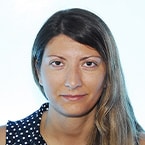AACR-Amgen Fellowships in Clinical/Translational Cancer Research
The AACR-Amgen Fellowships in Clinical/Translational Cancer Research represent a joint effort to encourage and support mentored young investigators to conduct clinical or translational cancer research and to establish a successful career path in this field.
2022 Grantee

Research
Loss or downregulation of the target antigen has emerged as a major mechanism of resistance to CAR T cell therapy. Conventional CAR T cells are susceptible to immune escape because they require high target antigen density for activation. Novel designs are required to target cancers with heterogeneous antigen expression. Dr. Rotiroti and her colleagues have engineered a novel platform that amplifies the CAR T-cell response to tumor cells expressing lows levels of target antigen. They are set to deploy this platform to enhance CAR T-cell efficacy in relevant in vivo models of DLBCL.
Biography
Dr. Rotiroti developed her interest in cancer immunotherapy by joining the Fondazione Tettamanti in Monza, Italy as an undergraduate student. After her graduation (University of Milano-Bicocca, Italy), she enrolled in a doctoral program in molecular and translational medicine (University of Milano-Bicocca), continuing her research studies focused on the development of CAR T-cell therapies for the treatment of acute myeloid leukemia. She is currently a postdoctoral fellow at Stanford University, where she is developing new strategies to target tumors with heterogeneous antigen expression, to prevent immune escape through antigen downregulation.
Acknowledgment of Support
I am a translational researcher focused on immunology and the development of novel CAR T-cell therapies. I am strongly committed to use this fellowship to push the boundaries of my research and to develop my career as an independent investigator addressing major challenges in the field of cancer immunotherapy.